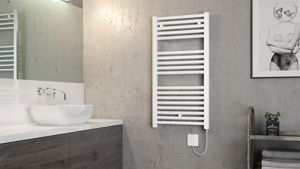Trying to choose the best radiator? Well, it starts with knowing exactly how the different radiator materials drastically affect your home's heating. But this short guide explaining all the different radiator materials will make sure you NEVER pay a penny more than you need to.
Your current problems might be that:
- You have to choose a metal
- Plus you have to choose a finish
- And don't really know what the difference is
- But want to pay as little as possible
- And prefer to not screw this up
Good news: it's all easy to understand the different radiator materials, so keep reading.
How to Skip This Guide and Still Make a Good Choice
Just use our BTU calculator to find a room's minimum BTU need, browse the radiators on our website until one catches your eyes, make sure it slightly exceeds your minimum BTU requirement, make sure it suits your budget, and buy it. It’s really that easy.
Still, knowing the different radiator materials and their benefits would be really useful...
What Radiators Are Made of
Radiators are made of conductive metals, the four main different radiator materials being: cast iron, mild steel, stainless steel, and aluminium. In that order of conductivity, and that order of price.
Different Radiator Materials: Stainless Steel, Aluminium, Steel, or Cast Iron?
Conductivity: “More conductive” means heat travels through it quicker. Cast iron radiators, for example again, take longer to heat up and longer to cool down than other materials. Before modern insulation that feature was a necessity, but today it’s just preference.
Appearance: There’s ample crossover at your basic radiator design level, but some materials work better for particular shapes and designs. In the case of cast iron radiators, for example, they don’t necessarily need to look vintage, but that’s what people expect so that’s what designers make.
Cast Iron Radiators
Found inside Victorian manor houses and arcane-looking libraries. These shrines to the industrial revolution have aesthetic appeal and have a reputation for being very efficient.
If you're keen for your heating to have more than a functional purpose these statuesque radiators are hugely reliable and create a beautiful feature.
What the salesman won't tell you: Thanks to their weighty quality, cast iron rads are heavy. And I mean HEAVY. Be prepared to pay more for installation. But while your plumber may mumble under his breath, your guests will drool with jealousy.
Should I Buy a Cast Iron Radiator?
Buy a cast iron radiator if you want a gorgeous period statement piece that holds its heat long after turned off. Of all the different radiator materials, this stays hotter for way longer after you turn it off.
Steel Radiators
Steel, or ‘mild steel’, is beloved by contemporary designers because it’s cheap and can be shaped into all sorts of wild and wonderful styles. They also come in a variety of colours. Obviously, cheap materials means a cheaper price for you, so if you need multiple radiators and you’re on a budget then steel is the way to go.
What the salesman won't tell you: They can be prone to rust buildup, but with a bit of care, and an inhibitor, you'll be fine.
Should I Buy a Steel Radiator?
Buy a steel radiator for a good budget radiator that's available in a huge variety of shapes, colours, and sizes thanks to its inexpensive materials.
Shall we take a peek at some customer favourites below?
Stainless-Steel Radiators
Stainless steel radiators are the easy-choice radiator of the different radiator materials. They conduct well but also keep their warmth for a while, and are easy to look after because they don’t rust. They’re not as cheap as mild steel, but prices start at an affordable level. Visually they range from the standard & simple, to a whole host of expressive and daring designs.
What the salesman won't tell you: It's not as invincible as many salesmen claim with "no maintenance ever". Though, it's not far from the truth.
Should I Buy a Stainless Steel Radiator?
Buy a stainless steel radiator if you want a long term investment that requires very little maintenance, conducts well, but also holds its heat for a couple-ish hours after being turned off.
Let's have a look at some of our greatest hits below.
Aluminium Radiators - The Best?
Yes, aluminium radiators are the best of all the different radiator materials. They're superconductors that heat fast and spread the heat fast. They have the highest possible BTU output and best responsiveness, but also the highest price.
They’re absolutely worth every penny. But if you’re trying to outfit a whole house and can’t blow the budget on a single radiator, then an aluminium radiator might not be the best for you, purely for budget reasons.
What the salesman won't tell you: while cast iron rads could survive a meteor impact, you need to treat aluminium with care to avoid dents. Anything this well-designed needs a gentle touch.
Should I Buy an Aluminium Radiator?
If you can afford it, yes. Not because you can, and not because it's 'luxury', and not because it'll make your friends drool, but because you'll save money in the long run. You'll feel the benefits immediately, no matter the home.
Let's have a look at some of our favourite wonders of the aluminium heating world.
Conclusion
As you can see now, the different radiator materials have an effect on the performance of your radiator. Though the real question to ask yourself is "what radiator belongs in my home? And what's it for?" In the bathroom do you need an aluminium towel rail or a stainless steel designer radiator? Maybe both. It's all up to you - which should be easy now you know your cast iron from your steel.








